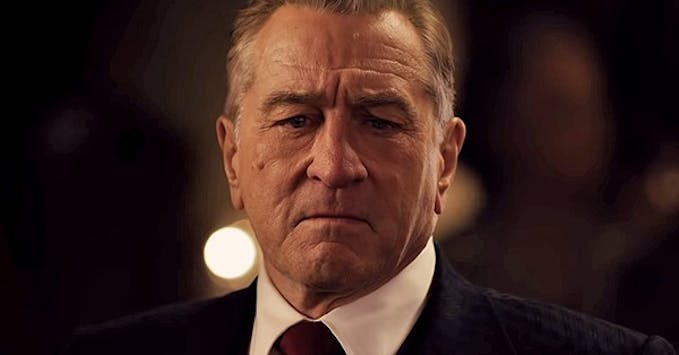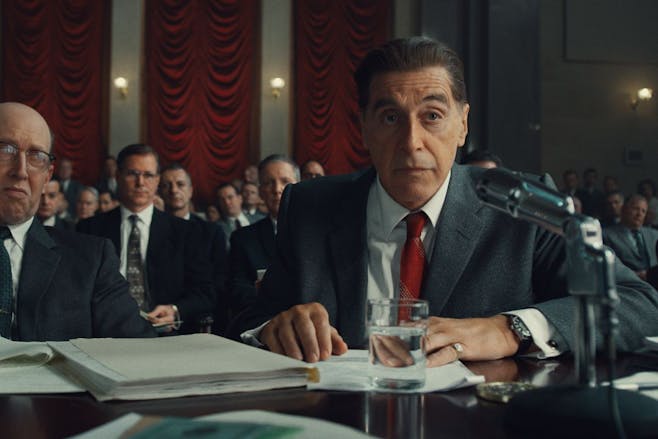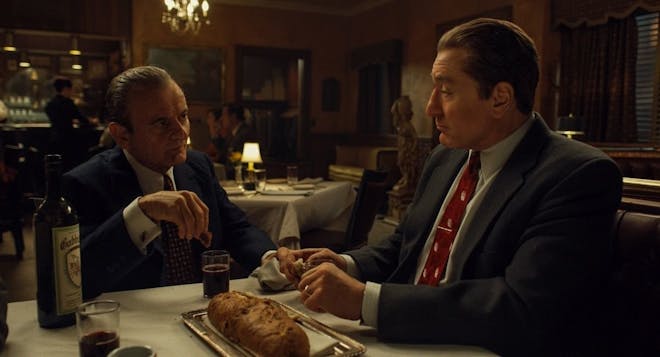One of 2019’s most anticipated films, “The Irishman” seemed too good to be true when the project was originally announced. Not only was it to be directed by Martin Scorsese, one of the greatest filmmakers of all time, but the director would bring together screen legends Robert De Niro, Al Pacino and Joe Pesci in a film that sounded dreamlike for fans of mob films and the crime genre.
Scorsese has shined once again, crafting a film that elevates the senses. While he may not be a fan of Marvel movies, there’s no denying we’re witnessing the work of a master.
Expect “The Irishman” to be a leading contender for numerous awards.
Scorsese’s latest is instinctually being compared to his former crime works such as “Goodfellas,” “The Departed” and “Casino,” yet with “The Irishman” he has done a unique job in crafting a picture unlike anything he’s ever done yet still manages to incorporate touches of his artistic style that made him so internationally acclaimed in the first place. We have several engaging tracking shots that enable us to engage with the setting and experience the characters’ sights and surroundings. Scorsese additionally utilizes spectacular slow-motion sequences that allow us as an audience to view the intimate details and gravity of certain situations.
What distinguishes “The Irishman” from not only Scorsese’s past work in the crime genre but the vast majority of mafia films is his style. While “Goodfellas,” “The Departed” and “The Wolf of Wall Street” contained constant excitement and riveting intensity, “The Irishman” follows a subtler, more nuanced approach and is more of a character study that examines more crucial topics of the human condition. Instead of every scene being filled with tension, intensity or conflict, “The Irishman” takes its time and strives to let the audience understand everything there is to possibly know about the characters, letting us study their faces and get inside their heads so that we can eventually predict what they’re going to say before they open their mouths.
An adaptation of the narrative nonfiction book “I Heard You Paint Houses” by Charles Brandt, “The Irishman” chronicles the life of Frank Sheeran (De Niro), a truck driver and WWII veteran who ends up working as an assassin for Philadelphia mob boss Russell “Russ” Bufalino (Joe Pesci). Both Bufalino and Sheeran grow close and have mutual respect making their relationship one of the most intriguing elements of the film. Sheeran takes out whoever he’s asked with no questions, his lifestyle becoming robotic as he gradually falls apart from his four daughters.

Sheeran soon starts working with famed union leader Jimmy Hoffa (Al Pacino) as his bodyguard, who he meets due to Hoffa’s financial ties to the Bufalino Crime Family. Frank Sheeran is most notable for being the alleged man who killed Jimmy Hoffa after confessing — to this day no one truly knows what caused Hoffa to vanish in 1975. The film explores at length the two’s relationships and, without spoiling anything, examines the eventual despair and repercussions of their connection.
The film digs deep into the rich history of Hoffa and his feud with the Kennedy family. Scorsese examines the secretive acts of corruption that both politicians and mobsters orchestrated to shape vital policy in the United States. We get to follow Hoffa’s influential political career and his tension with both President John F. Kennedy and his younger brother Attorney General Robert Kennedy and Hoffa’s constant quest for power through Sheeran’s point of view, making the film excel as a narrative.
While Hoffa is no doubt committed to working people and his union, power is his underlying motivation throughout the film. Sheeran, on the other hand, doesn't seem to have much motivation besides making a living and getting the job done. He is by no means on a quest for power or wealth, his lifestyle never changing, despite his rising status in the Bufalino Crime Family.
Scorsese has crafted a crime film on an entirely new level. While at times the film is very slow and about 35 minutes of its 3-and-a-half-hour runtime could have been cut, “The Irishman” is a monumental crime epic and a new American classic. This is a Hollywood epic created by some of the most gifted icons in the entertainment industry and the results solidify this.
“Goodfellas” will always be Scorsese’s greatest film, and I can think of at least three of his other films that I personally enjoyed more than his latest. However, the veteran director has crafted his most ambitious project yet and delivers a film close to his original roots in crime filmmaking that expresses his abilities vividly.
Scorsese’s wisdom and years of experience as a director are exemplified in every frame and sequence even when the film lags in its narrative. Every character on screen has a purpose and Scorsese and Academy Award-winning screenwriter Steven Zaillian (“Schindler’s List”) ensures that we are well aware of everyone involved in this story. Additionally, Scorsese’s longtime editor Thelma Schoonmaker has yet again put together a film that stunningly depicts this story, the film flowing beautifully between each frame.

On-screen, De Niro, Pacino and Pesci have some of the best chemistry in film history. Each actor says every bit of dialogue naturally, almost as if they never even read the script and are naturally aware of what to say. De Niro gives one of his best performances in years, his best acting expressed in his varied facial expressions that invite us into the actor’s thoughts and feelings. Towards the end, De Niro shows off his vulnerability and heart-wrenching talent like you’ve never seen before — the iconic “tough guy” portraying a broken soul with nothing left.
Pacino has a ball as Jimmy Hoffa, having the opportunity to give another one of his famous on-screen outbursts and given dialogue that only he was born to say. His character’s big mouth and stubborn personality give the “Godfather” actor a chance to have fun and shine as the actor we all know and love.
While De Niro and Pacino are beyond impressive, it’s Joe Pesci, coming out of retirement to make the film, who delivers the most memorable performance. Usually, the hot-headed, cold-blooded killer, most notably as Tommy DeVito in “Goodfellas,” Pesci delivers a 180 from his previous work. His portrayal as Russell Buflaino is calmer, his character a wise businessman who shows signs of humanity throughout the film. Pesci’s work in this film will catch everyone off guard with him as a soft-spoken, easy-going mastermind who uses his danger strategically instead of loosely.

Much of the talk on the film focuses on its $160 million budget and how Netflix chose to produce the film after no other studio would take it, as well as the de-aging CGI used on De Niro while portraying Sheeran in his forties. Admittedly, the CGI is ineffective. We can still tell De Niro’s actual age, but that’s beside the point. We don't need CGI to get what Scorsese is trying to express. Through his artistic direction and his actors’ masterful performances, we’re sunken into a story about regret and the decisions we make in the past that impact our lives.
As always, Scorsese invokes a constant moral ambiguity that makes us empathize with each character despite their illegal and immoral actions. While not as focused as his past films and not entertaining enough to deserve an extremely long runtime, Scorsese has crafted what very well could be the last great mob movie. This may be a film that is better experienced in increments instead of one theatrical viewing, yet theatrically it excels due to its stunning direction and an exuberant chronicle of crime.
“The Irishman” is one of the best films of 2019 and a visionary crime epic that will be talked about for years.
Final Grade: A
Dominic LeRose is a staff writer for The Daily Cardinal. To read more of his work, click here.






